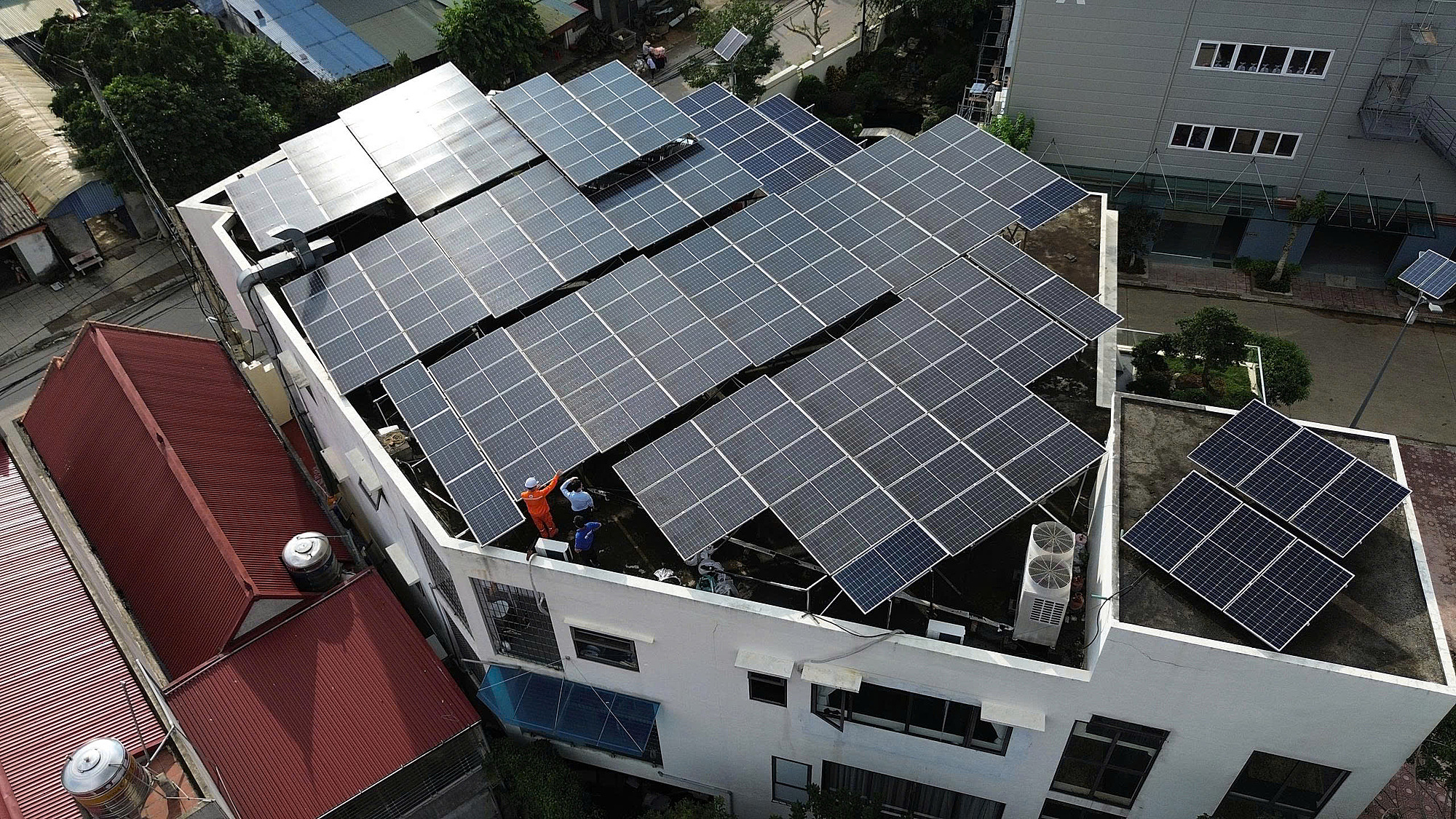Vietnam Electricity (EVN) recently proposed penalties for organizations and individuals who install rooftop solar power systems for self-consumption without notifying or registering with the authorities. This proposal has raised questions about why systems used solely for households or internal business operations, without selling electricity back to the grid, still need to be reported.
The regulations for registration and reporting of rooftop solar installations are outlined in Decree 58/2025 on renewable energy development. Specifically, individuals and businesses installing rooftop solar systems, whether connected to the national grid or not, with a capacity under 100 kW, only need to notify the Department of Industry and Trade and the local power company. The notification should include capacity, installation location, and intended use. Compliance with building codes, fire safety regulations, and environmental protection is also mandatory. After notification, users have autonomy over their solar power systems.
Systems over 100 kW require a submission for grid connection, monitoring, control, and data acquisition (scada). If connecting to the national grid, regardless of whether excess electricity is sold or not, organizations and individuals must provide detailed information for inspection and acceptance by the power company. Similarly, systems under 1,000 kW connected to the grid without selling excess power also require notification to relevant authorities.
For grid-connected rooftop solar systems exceeding 1,000 kW, or projects under 1,000 kW intending to sell electricity, a registration certificate from the Department of Industry and Trade is required. The provincial power authority must also confirm that the project will not overload the local grid.
These notification and registration requirements were also present in the 2024 decree on the development of self-consumption rooftop solar power.
 |
Rooftop solar power system installed on a house. Photo: Phuong Anh |
Rooftop solar power system installed on a house. Photo: Phuong Anh
Rooftop solar power for self-consumption is encouraged and not subject to capacity limits if not connected to the grid. However, according to the Ministry of Industry and Trade, these systems need to be managed and monitored to ensure the safety and stability of the national grid.
Solar energy is a distributed power source, dependent on unpredictable factors like solar radiation and weather. During periods without sunlight (cloudy, rainy weather, or nighttime), solar power output can fluctuate rapidly, increasing demand on the grid. This requires grid operators to adjust and mobilize additional capacity from baseload sources (hydropower, thermal power) to compensate. Therefore, government oversight is necessary for the safe operation of the national grid.
Energy expert, Associate Professor Dr. Tran Van Binh, pointed out the lower reliability of solar and wind power compared to the consistent operation required of the power system. For example, a 100 MW solar power source could experience a sudden drop in output due to unexpected rain. This necessitates immediate compensation of 100 MW from other sources. Without this, the power system could fail, leading to regional blackouts.
Additionally, authorities need to monitor the total power capacity, as exceeding planned capacity can impact the system's power source structure.
Currently, Vietnam has around 103,000 rooftop solar projects, with a total installed capacity of over 9,500 MW. According to the adjusted Power Development Plan VIII, Vietnam aims for 50% of office buildings and 50% of households to utilize self-consumption rooftop solar power by 2030.
Pham Dang An, Deputy General Director of Vu Phong Energy Group, views the requirement for individuals and organizations to report rooftop solar installations, especially self-consumption systems, as a positive sign. He believes this reflects the growing maturity of the renewable energy market.
"These reporting and registration requirements provide authorities with a comprehensive view of the power system, including both large-scale and distributed generation (solar and wind power)", he said, adding that this regulation will improve operational efficiency, support demand forecasting, and facilitate balanced power source management. This will also prevent waste and mitigate the risk of local overloads.
Furthermore, this mechanism helps the power sector identify areas needing grid infrastructure upgrades, preparing for new energy trends such as electric vehicles, green manufacturing, and household energy storage. It also ensures that installations adhere to technical and fire safety standards, reducing operational risks.
According to An, integrating clean energy into daily life is an inevitable trend, but success doesn't lie in imposing penalties. He suggests that the registration and notification process should be simple, transparent, and fully online, allowing people to complete it within 1-2 days.
He also emphasized the need to distinguish between EVN's role in managing electricity demand data and the fire and building authorities' responsibility for safety assessments.
"Penalties should only be applied when there's a real risk to the power system or public safety," the expert proposed.
Phuong Dung












